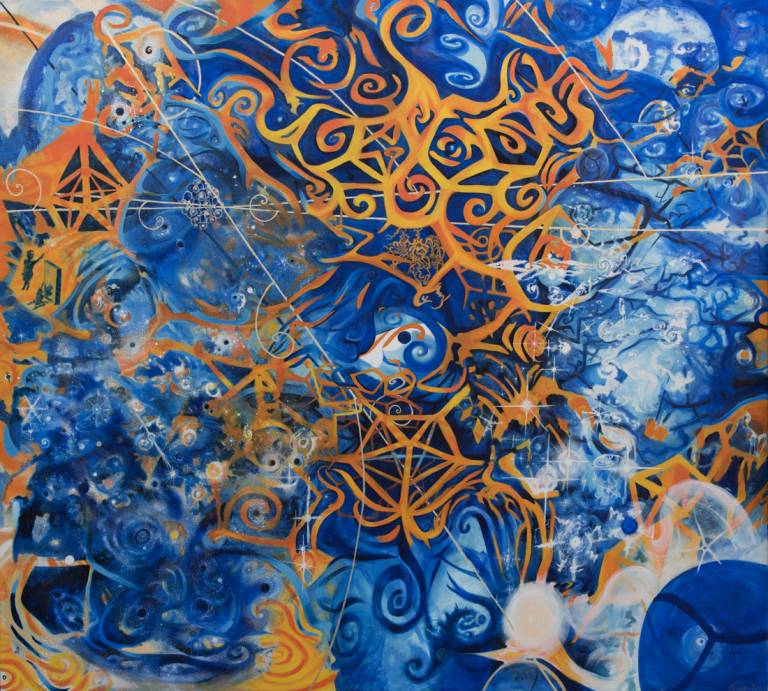Making sense of the Universe through art and physics
1 August 2017
This month a painting by interdisciplinary artist Penelope Rose Cowley and commissioned by the UCL Cosmoparticle Initiative was hung in the new Cosmoparticle Hub.

Image: Cosmoparticle by Penelope Rose Cowley
Titled Cosmoparticle, the artwork measures two metres wide and nearly two metres high. It may at first appear to be highly abstract, but captures a nuanced view of the interconnection between cosmology and particle physics that the Initiative aims to foster. Cowley created the artwork though extensive consultation with Professor Hiranya Peiris and Dr Andrew Pontzen of the Astrophysics Group and Dr Chamkaur Ghag of the High Energy Physics Group, studying their research in great detail over many months of planning.
Through dozens of interviews and meetings, plus extensive use of graphics and images drawn from the raw science, Cowley aimed to give new life to their ideas with her own interpretation, while at the same time representing concepts from particle physics and cosmology as faithfully as possible: Prof Peiris’s studies of cosmic background radiation, Dr Pontzen’s simulations of the formation of galaxies, and Dr Ghag’s work on the direct detection of dark matter particles.
“I love all parts of a commission, but especially the initial stages, taking everyone’s ideas together and letting them ferment in my mind and assimilate into visual representations,” she says. “I feel like some kind of cathode galvanizing the wonderful work of physicists.”
After extensive planning, Cowley aimed – using six different layers of paint, each overlaying and interacting with the next – to represent a specific number of phenomena: the tracks of charged particles, dark matter filaments, cosmic background radiation, galaxy formation, gravitational waves, and – to represent the birth of the universe – images of the blood vessels in a human brain taken with an MRI scanner.
“As I layered the paint, I literally used my brush to ‘pull’ galaxies through from the first layer of paint to the next – In this way I wanted to created a feeling of connection between regular matter and dark matter,” says Cowley.
And for the finishing touches: a few bubble universes, galaxy clusters, black holes, neutron stars, pulsars, complex geometric shapes, and the “monolith” from 2001: A Space Odyssey tucked away on the left hand side.
“It is an extraordinary honour to be given this opportunity to create an artwork about this subject matter – I felt like I could become absorbed with its meaning and do the ideas justice,” says Cowley. “The words of Andrew and Hiranya, explaining that ‘out of complexity comes simplicity,’ echoed in my head. I wanted the painting to have that essence.” Despite the complexity of the layered painting it has a coherent unity. Just as the universe does, with all its overwhelming complexity held together by underlying, unifying principles.
Her aim is for any cosmologist or particle physicist strolling by to be able to spot traces of their own work in the giant assemblage of blue, gold orange and white swirls. To the layperson, it is merely beautiful – but to UCL’s physicists, it will symbolise so much more.
“I loved seeing the layers upon layers, the complexity of it all,” says Prof Peiris. “It was a deep privilege for us to gain an insight into her creative process. She really captured something essential about how the universe truly feels – at least to me.”
Written by Zoe Cormier, an author and science writer based in London.
Cosmoparticle by Penelope Rose Cowley
Commissioned by Hiranya Peiris, UCL
 Close
Close

